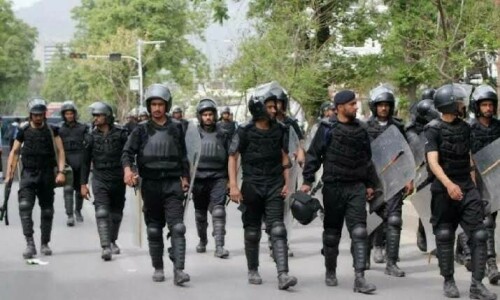WASHINGTON: Even as debate over the Iraq war continues to rage, signs are emerging of a convergence of opinion on how the Bush administration might begin to get out of the conflict. In a departure from past statements, US Secretary of State Condoleezza Rice said this week that the training of Iraqi troops has advanced so far that the current number of US troops probably will not be needed for much longer. President Bush will give a major speech on Wednesday at the US Naval Academy in which aides say he is expected to proclaim the improved readiness of Iraqi troops, which he has identified as the key condition for withdrawing US forces.
The administration’s pivot on the issue comes at a time when the White House needs to relieve enormous political pressure by war opponents, including liberals, moderates and old-line conservatives who are uneasy with the costly and uncertain nation-building effort.
It also follows agreement this week among Iraqi politicians from all three major ethnic and religious groups that the number of US troops ought to decrease. Meeting in Cairo, the Iraqis called for a US withdrawal and recognized Iraqis’ “legitimate right of resistance” to foreign occupation. In private conversations, Iraqi officials discussed a possible two-year withdrawal period, analysts said.
The developments seemed to lay the groundwork for potentially large withdrawals in 2006 and 2007, consistent with scenarios outlined by Pentagon planners. The approach also tracks the thinking of some centrist Democrats such as Sen. Joseph R. Biden Jr., D-Del., the senior Democrat on the Senate Foreign Relations Committee. Some analysts say the emerging consensus might have less to do with conditions in Iraq than the long-term strain of the deployment on the US military. And major questions over the readiness of Iraq’s fledgling security forces pose risks for any strategy that calls for an accelerated American troop withdrawal.
As recently as late September, senior US military commanders told a congressional hearing that just one Iraqi battalion, about 700 soldiers, was considered capable of conducting combat operations fully independent of any US support. Administration officials now dismiss that measure of military readiness, saying more Iraqi units are able to perform advanced operations each day.
A former top Pentagon official who served during Bush’s first term said he believes there is a “growing consensus” for a withdrawal of about 40,000 troops before next year’s US elections. That would be followed by further substantial withdrawals in 2007 if it becomes clear that the Iraqi forces can contain the insurgency.
“You’ve got the convergence of domestic pressures, Iraqi pressures, and Pentagon (withdrawal) plans that have been in the works for a while,” said the former official, who spoke on condition of anonymity because of the sensitivity of the issue. “This is serious.”
A senior US official said that in signalling hopes for a large drawdown next year, Rice this week was only “stating the obvious.” “It looks like things are headed in the right direction to enable that to happen in 2006,” said the official, who spoke on condition of anonymity.
But he added those hopes still could be derailed if there are setbacks. Among the key markers ahead are Dec. 15 elections for a permanent Iraqi government. Officials have said violence probably will increase before the elections. More than 100 more US troops have died in the month since the death toll reached 2,000. US officials hope that by the end of 2007, the US force remaining in Iraq would be small enough not to offend Iraqi sensibilities, yet large enough to help Iraq’s military with reconnaissance, intelligence-gathering and air support. Such an approach might be more acceptable to Republican candidates who are worried about running in mid-term elections next year amid plummeting support for the war, and perhaps also to GOP presidential candidates looking to run in 2008.
Bush’s handling of the war has the support of about 35 per cent of the public, according to the latest Gallup poll; other surveys have showed recently that only 40 per cent of Americans believe the president is honest and trustworthy. In recent months, Bush has rebuffed questions about a schedule for withdrawal, saying that providing a specific timetable would hearten insurgents and encourage them to wait out the Americans.
There are approximately 160,000 US troops in Iraq, and a widening field of critics has called for reductions. Last week, Rep. John Murtha, D-Pa., known as a military hawk, said it was time for US forces to begin withdrawing, initially provoking a furious administration response that Bush and Vice President Dick Cheney later sought to temper. The shift in the administration’s attitude also might reflect concern that the US military cannot bear to have the current strains continue indefinitely. Some military and political analysts believe that the potential long-term damage to America’s armed forces, not political pressure, could be the decisive factor for Bush and people around him.
Andrew F. Krepinevich Jr. a former Pentagon official who now heads the Centre for Strategic and Budgetary Assessments, an independent defence research group in Washington, argued that these strains have become a key factor driving administration thinking.
Unlike the Vietnam era, when the military had a nearly endless supply of draftees, the Iraqi experience sharply has reduced the flow of new recruits into the volunteer Army at a time when attrition rates are also alarmingly high, Krepinevich noted.
Other factors, such as federal restrictions on the frequency of National Guard deployments, also limit the personnel available.
Differences this summer between the White House and some senior military commanders over troop reductions were the result of these military problems, analysts believe.
While divisions remain within the administration, there are growing signs that Bush might be calculating that a faster drawdown carries fewer long-term risks. “I think the administration will yield to the reality of an army that is apparently beginning to buckle under the strain of these long-term deployments,” Krepinevich said.
Other factors are also at work, including signs of a revised sense of Iraq’s own military capabilities. Rice’s upbeat statement earlier this week that Iraq forces “fairly soon” would be able to defend their country came just a few days after a brief trip to Iraq.
Some analysts see the same progress that Rice does, yet are worried that the White House might move too fast.—Dawn/Los Angeles Times News Service












































Dear visitor, the comments section is undergoing an overhaul and will return soon.